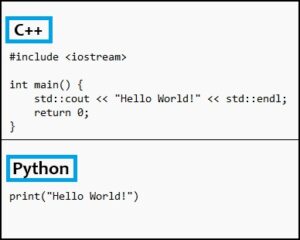Beginners to programming often ask themselves which programming language they should start with. Even experienced programmers like to seek out new challenges. In recent years, the name Python has come up very often in such discussions. In this article, I will therefore address the questions of what Python is and why you should learn Python.

What is Python?
Although there has been a real Python boom in recent years and the language is becoming increasingly important, Python is not a new programming language. It was developed in the 1980s by Dutch programmer Guido van Rossum. Van Rossum initially developed Python as a purely private project and hobby.
If you didn’t know the language before but like English humor, the name may sound familiar to you. Guido van Rossum was a fan of the British comedy group Monty Python, which became famous for Life of Brian, among other things. For this reason, he named the programming language after the group and simply called it Python.
Python has several advantages over other programming languages. The syntax is simple and intuitive, the language is very versatile, and you can save a lot of source code. But these are not the only advantages of Python. Below, we look at 8 reasons why you should learn Python.
8 reasons to learn Python
1. Easy to learn
Python syntax is fairly simple and intuitive. Unlike other programming languages, Python allows you to save a few lines of code. When beginners read Python code, it is intuitively easier to understand than other programming languages.
Let’s look at the Hello World output as an example, which is traditionally used as the first example when learning a programming language. Above is the code in C++, below in Python:

Which code will a beginner understand better? The code below clearly shows what is happening. The first code, on the other hand… How is a beginner supposed to understand that?
However, a word of caution is in order here. Python is easy to learn, but that does not mean that programming itself is easy. We must remember Bushnell’s Law: Easy to learn, difficult to master. A difficult programming project does not become easy just because you solve it with Python. A difficult project remains difficult.
However, the basic syntax of Python is easy to learn, and thanks to the many libraries (see point 3), projects can also be simplified.
2. Python is very versatile
If you look at the Wikipedia entry for Python, the very first sentence reads as follows:
Python is a high-level, general-purpose programming language.
I have taken the liberty of highlighting “general-purpose” in the above quote, as it is important. Such programming languages were not developed for a specific purpose, such as web development or database programming alone. Instead, they can be used for a wide variety of purposes.
Python can be used for a particularly wide range of purposes. These include:
- Web development
- Game development
- Data engineering
- Machine learning and AI
- Data mining
- Task automation
If you are interested in several of these fields, you don’t need to learn many different programming languages. Python provides a very good basis for a wide range of applications.
3. Many different libraries
When you start a Python project, you don’t have to write every line of code yourself. There are countless libraries for Python problems that have already been solved and that you can use for your project.
The exact number of libraries is unknown, as every user can create and make available their own library. If you are interested in libraries, you can take a look at pypi.org. PYPI is the abbreviation for Python Package Index.
4. Good career opportunities
In point 2, we already saw that Python is very versatile and can be used for many different purposes. This also makes this language particularly attractive for the job market.
Data analysts and all jobs related to data are in high demand today. According to LinkedIn, Python is the most popular programming language in 2025. For many years, Java held the top spot, but it has now been overtaken by Python.
5. High salaries
According to glassdoor.com, the average salary for Python developers in the US is more than $125,000. This is an average value. The actual salary depends on factors such as professional experience and skills.
Even if you have to start small as a career starter, the earning potential is very good. Due to the good future prospects (see next point), this is not likely to change anytime soon.
6. Good future prospects
As a Python expert, you not only have very good career opportunities in the present, as described in point 4. There are also no signs that this will change in the future. On the contrary, Python seems to be becoming increasingly important.
Topics such as artificial intelligence, machine learning, and automation are much more important today than they were in the early days of Python, and they are becoming increasingly important. Large companies such as Google and Amazon, but also smaller companies, will continue to have a high demand for experts in these areas in the future, and this is not likely to change anytime soon.
7. Large, global community
Due to Python’s popularity, a very large global community of Python developers and enthusiasts has developed over the last few years and decades. This has several advantages:
- You are not left to deal with problems on your own and can quickly find help on the internet.
- You can get in touch with companies or other developers more quickly, thereby increasing your job prospects.
- For beginners, there are many tutorials, courses, scripts, etc. available for learning.
- Thanks to this exchange, the language can be continuously developed and adapted to modern developments.
8. High scalability
Scalability means that a system can cope with increased demands when the load is greater (for example, more data or more users). The project and requirements grow without compromising performance.
Let’s assume I start a small programming project and choose a programming language for it. If I want to expand the project later, but the programming language cannot handle the increased requirements, it is not scalable or only slightly scalable.
Python is a programming language with high scalability. Due to the diversity of applications (point 2) and the many libraries (point 3), you can continue to expand existing projects without reaching any limits. Python is therefore a very good choice for new projects that could grow further in the future.
How can I learn Python?
As mentioned, Python is quite easy to learn, even for beginners. Experienced programmers won’t have much trouble anyway. In general, we can say that it is much easier to learn a programming language if you already know another one.
There are several ways to teach yourself Python. For example, there are books, online courses, tutorials, and videos. This allows you to learn at your own pace.
Recommended books include Python Distilled by David Beazly* and Python Crash Course by Eric Matthes*. There are also good online tutorials such as Python courses from Coding Nomads.
Links marked with an asterisk (*) are affiliate links. If you purchase a product via such a link, I will receive a small percentage of the purchase price as commission. This does not incur any additional costs for you.
0 Comments